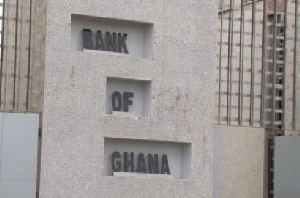The Bank of Ghana (BOG) has denied responsibility for the fiasco involving DKM Micro Financial Limited, adding that it is in the process of liquidating the assets of the company to pay off depositors.
A number of Ghanaians, especially in the Brong Ahafo and the three northern regions, have fallen victim to a bunco scheme by the micro finance companies and lost their deposits.
The micro-finance company was alleged to have invested GHC77 million of its customers’ deposits in its subsidiary companies-KM Airlines Company, DKM Fuel Station, DKM Transport, DKM Shea Butter Company and DKM Mining Company, among others.
Millions of cash deposits of customers of the DKM, Jastar Motors, God is Love Fun Club, Perfect Edge and others in the illegal savings business in the affected regions were locked up, following the BoG’s move 2015 to stop the companies from operations due to their violations of the savings and banking laws and regulations.
Dr Henry Kofi Akpenamawu Wampah, Governor of the BOG, said the Central Bank could not be blamed for not monitoring the crisis after a number of investors had lost their deposits.
Briefing Parliament on the extent of BOG to monitor operations of the microfinance companies, the Governor said the Bank could not be blamed because the law says they should undertake field visits once in a year.
DKM Financial Services is a micro-finance company with its head office in Sunyani. It has six branches in Wenchi, Techiman, Bolgatanga, Wa, Berekum, and Nkoranza.
The Governor was not certain if proceeds from the sale of assets of DKM would be enough to pay the ¢115 million collected from depositors.
He said with emphasis that the Central Bank would not consider any form of bailout package for customers who lost their deposits in the DKM financial services.
He said it would not be feasible for the central bank to pay depositors who lost their monies due to bad financial practices by a private micro-finance company.
Consequently, the BoG has withdrawn license of DKM and had commenced the process of liquidating the assets of the company to pay off the depositors, although the process can take several months and years.
Contrary to calls on the central bank to extend some form of bail out for the depositors, Dr Wampah urged the customers to wait for the liquidation process to proceed for them to get back their deposits and stressed that the bank would not consider any form of bailout.
“Any attempt to bailout the customers would set a bad precedence that the Central Bank would always come in to bailout depositors of financial institutions anytime these institutions were being liquidated, “Dr Wampah said.
He said customers who lost their deposits to financial institutions which had been liquidated in the past would take advantage of the situation and demand that they should also be compensated for the mismanagement by their financial institutions.
Dr Wampah dismissed suggestions that the central bank was negligent in monitoring the misconduct of DKM and other financial institutions and indicated that “this is a normal situation. Institutions do fail sometimes. Even in situations where we have law enforcement agencies, some people will still find a way to violate the law.
The Governor announced that Price WaterHouse, an international auditing firm, has been engaged to assist in the liquidation process and indicated that the BoG was ascertaining the total assets of the institution and its related companies as well as the deposit liabilities and other liabilities of the company.
“The law clearly states that depositors have the first call of any assets that are identified. Once we identify the assets, then there will be a plan to settle the depositors,” he said.
“We cannot go every day to an institution on the mission to see exactly what they do, because the laws of the land demands we go for inspection on yearly basis, and if an institution is not performing well or done something wrong we (Bank of Ghana) would only get hold of the them when we go on inspection,” he said.
He said the amount depositors would get would depend on the total assets of the financial institution.
Also, the BOG has engaged an institution known as the Ghana Micro-finance Institutions (GAMFI) and given them the needed logistics to assist in the monitoring of the micro-finance companies across the country.
Dr Wampah said the BOG would embark on a comprehensive nationwide public education on the dangers connected with depositing monies to financial institutions that promised attractive interest rates in attempt to get more customers.
He agreed with the suggestion that the BOG should collaborate with the various District Assemblies to monitor the activities of the financial institutions in their districts to avoid such situations.
Business News of Thursday, 10 March 2016
Source: GNA

















